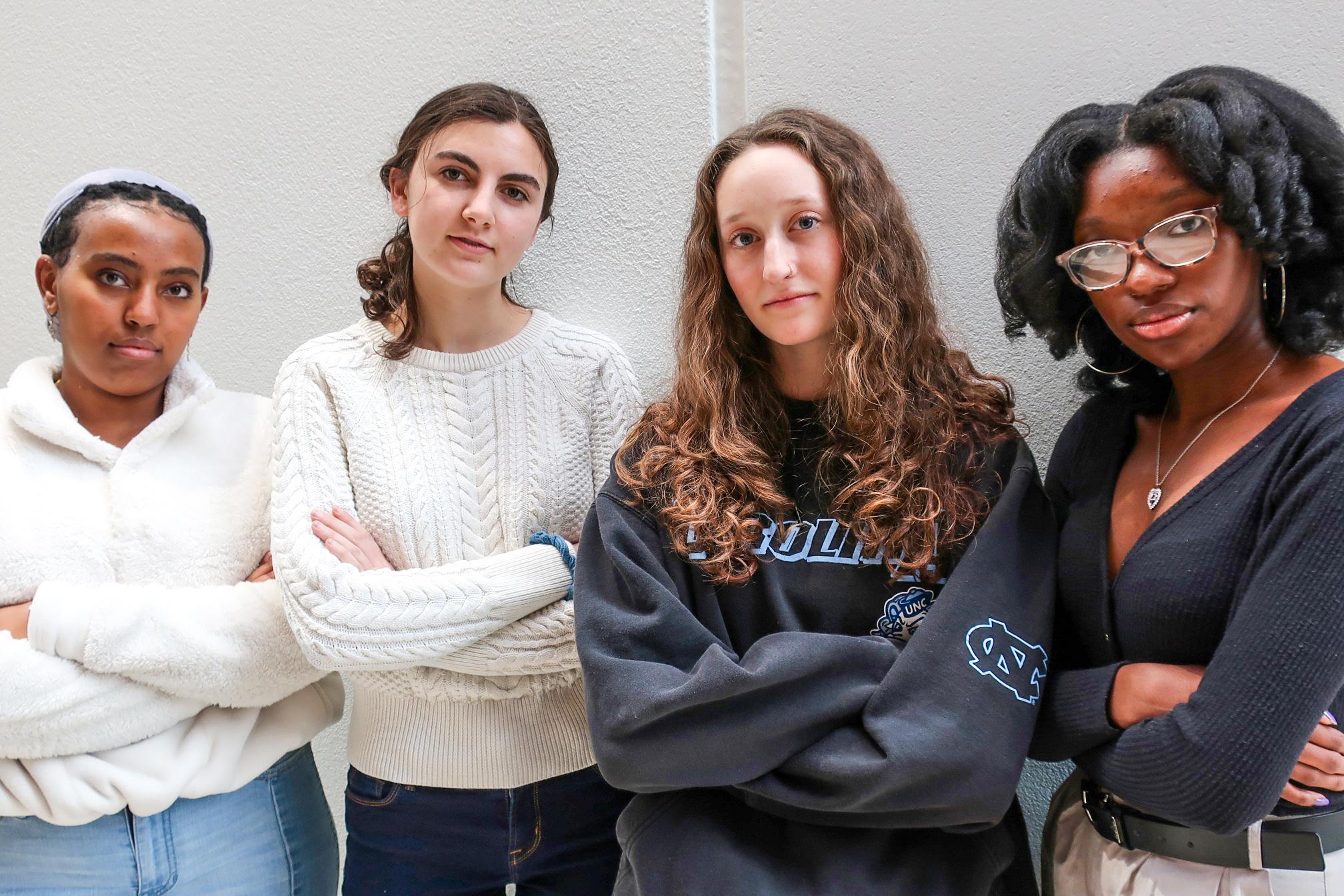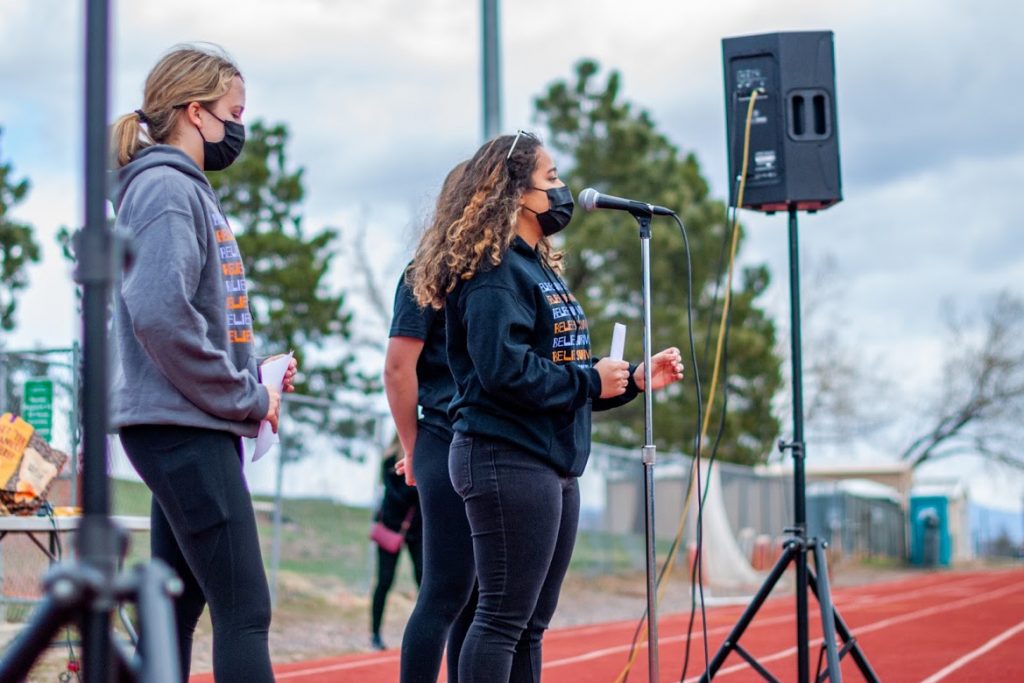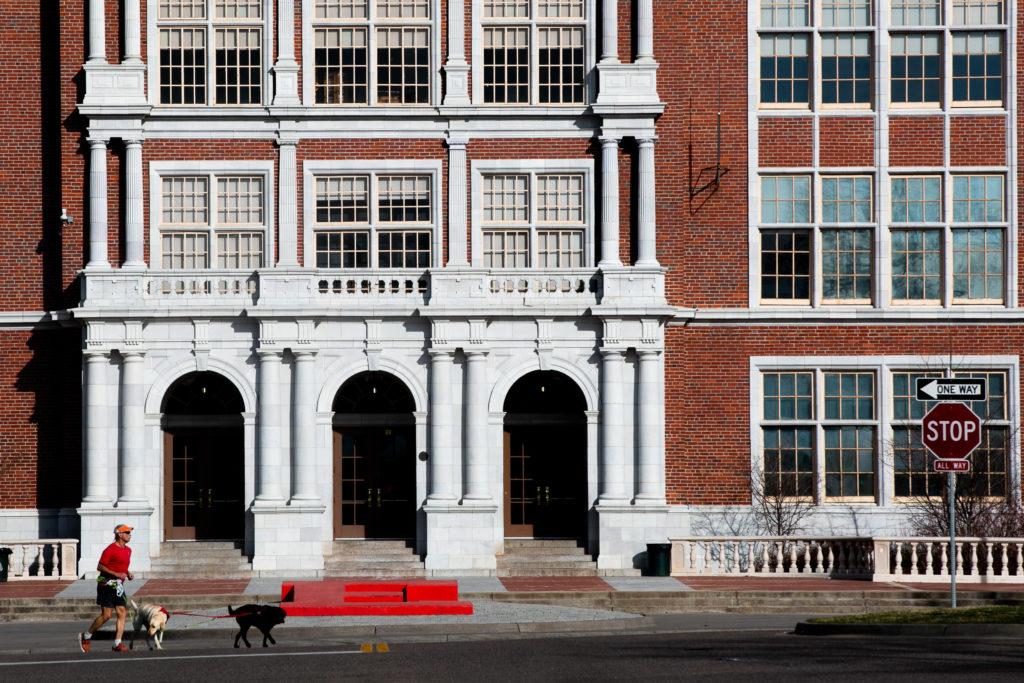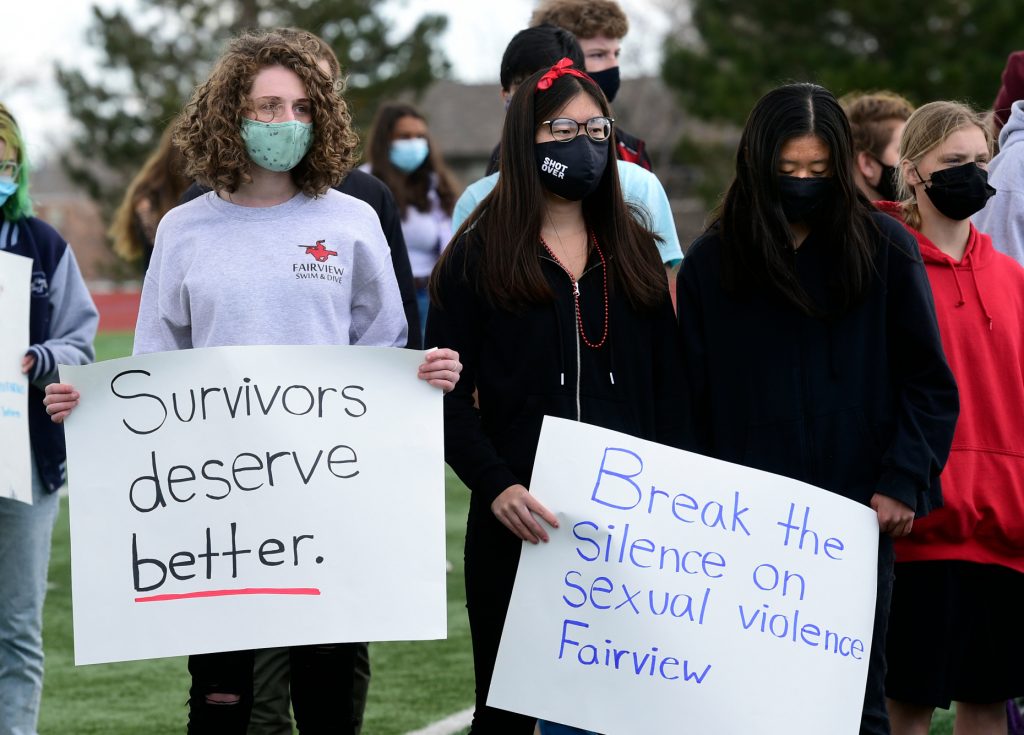
Lilia Scudamore was scrolling through Snapchat one warm August evening.
One post stopped her cold: a former classmate writing about being sexually assaulted by a boy she knew. Then more girls posted about this same boy. Post after post came in over the next three days about the same boy or sexual misconduct by other boys. The reposting eventually became a flood.
“It was heartbreaking,” said Scudamore, a senior at East High School in Denver. But Scudamore said she also felt relief that students were comfortable enough to share their stories and that those stories were being met with support.
This wasn’t the first time there’d been allegations of sexual assault at East. Scudamore remembered one from her freshman year. A girl accusing a boy on a sports team of sexual assault. Over the years, she and her classmates heard other stories about girls not getting the support they felt they deserved when something similar happened. Scudamore’s classmate Hermela Goshu, who sits on the student council, said girls of color would especially approach her. Goshu is Black; they said they didn’t feel safe going to anyone else.
“People were coming to me asking, ‘How do I report, how do I say this?’ and I was like, ‘I don’t know!’”
After school officials cautioned students that their social media posts alleging sexual misconduct could be construed as cyberbullying, the heartbreak and relief at not being alone turned to anger for many students. A few days later, about 100 students rallied on Colfax Avenue near the school to protest how their school and Denver Public Schools were handling the sexual misconduct allegations.
“We saw people from around the district noticing that this was true in their high schools as well,” Scudamore said.
She’d taken a class in constitutional law the year before. She wanted to look at the district’s policies on sexual misconduct.
“I knew how to read those documents,” she said.
She wanted to examine if the school’s and district’s policies followed Title IX, the federal equity law school districts are governed by. In what way did the policies support survivors of sexual abuse and why don’t students know about them? Why do schools respond the way they do? Scudamore wondered where to start pressing for change. She’d remembered an article she’d read in the paper about two student activists in Boulder. She reached out to them.
Scudamore and her Denver classmates would soon become part of a growing movement of high school students in California, Colorado, Maryland and elsewhere across the United States who are pushing for greater clarity in school district policies on sexual harassment and misconduct, as well as stronger sexual violence prevention education.
The problem is larger than school district policies, students say. It's also the way school administrators and mandatory reporters handle sexual assault allegations. There isn’t a sense that “this is wrong,” Goshu said.
“And the way that that's demonstrated is by the way that adults in our building choose to react to these kinds of situations and the way that, at least it seems, that perpetrators are protected and guarded from consequences to actions.”
The problem of sexual violence among students is significant.
In the 2019 Healthy Kids Colorado Survey, nearly 7 percent of students reported they’d been physically forced to have sexual intercourse when they didn’t want to. Eight percent said they made sexual comments, jokes, gestures or looks at someone when they were unwanted. At a Boulder Valley School District school board presentation in January, Boulder County Public Health officials said they saw a 64 percent increase in emergency room visits for sexual violence by 10- to 17-year-old’s in 2019-2020.
Now the experiences of two young women in Boulder are fueling change in Denver.
In 2018 and 2019, two high-profile cases involving allegations of sexual assault by two high school athletes roiled the student bodies in Boulder. One involved a Fairview High School football quarterback.
“The case that got media attention was only scratching the surface of how bad the problem was,” said Sophie Dellinger, 19, a Fairview graduate.

In the aftermath of those allegations, students wanted to talk about sexual assault. They wanted resources. But Dellinger said that at the time, the school ignored their requests.
“It makes you really angry,” said fellow Fairview student Beatriz Sanchez. “You feel really alone. You feel like you've been failed.”
So, Dellinger and Sanchez began four months of intensive research. They found major gaps in the Boulder Valley School District’s Title IX policies and the way schools handle sexual assault.
They took their concerns to the superintendent and school board, but the pair said they didn’t get anywhere. So, they filed a lengthy Title IX complaint through the federal Office of Civil Rights.
“I think the binder we had created was over 100 pages,” Dellinger said.
Under a voluntary resolution agreement, the Office of Civil Rights asked the district to remedy the students’ claims, among them that the district’s Title IX coordinator’s name and contact information wasn’t posted on the district website, that there was no notice of non-discrimination, and that there were no reporting procedures or Title IX complaint form available for students on the website.
“And the fact that a 17- and an 18-year-old had to tell them that they were in violation of these major sections of the law was very frustrating,” said Dellinger.
The two students helped revise district policies on the issue. In a recent letter to families, the district describes more changes: a link on its main web page directing students to where they can file complaints. Training for all staff. The creation of district Title IX Advisory Council, which will meet for the first time later this month. They also created a support website for those going through a complaint process, an information site for other students, and a website for BVSD Survivors of sexual assault.
But the students say their work isn’t done.
If you need help, dial 988 to reach the Suicide and Crisis Lifeline. You can also reach the Colorado Crisis Services hotline at 1-844-493-8255 or text “TALK” to 38255 to speak with a trained counselor or professional. Counselors are also available at walk-in locations or online to chat.
The Denver Students used what worked in Boulder as a guide to create their own push for change.
The East High students didn’t have to file a complaint with the Office of Civil Rights. In fact, Denver Public Schools’ Title IX coordinator agreed to meet with students bi-weekly starting last fall. Together, they’ve combed through DPS’s sexual misconduct and discipline policies. While DPS’s policy is compliant with federal law, student advocates say it’s not adequate. Why? Students say it’s 12 pages of legalese. That may be necessary from the district’s point of view, but it often doesn’t help a student who has been sexually assaulted.
“You read it and you're like, ‘I have no clue what this means,’” said East High senior Angel Kroger. “And it honestly pushes away survivors from even wanting to, to make a complaint. Because you're so confused. And you're like, ‘I can't do this, you know?’”
These DPS students say they’d like a step-by-step guide in plain language on how to report a concern or file a formal complaint and what services the school is supposed to provide like helping a survivor change classrooms if the accused student is in the same class.
“There is absolutely more we can and will do so that it is clear [and] easy to use, so people feel like they understand what their rights are,” said DPS’s general counsel Michelle Berge.
Berge added that all students in the district are able to call the district’s Title IX coordinator “and say what does this mean, please walk me through this.”
The students are also pushing to add some things and change parts of the policy they believe hurt students who file complaints. Berge explained the district has to be in line with federal law. She added that the new rules enacted by former Secretary of Education Betsy DeVos do give the accused the opportunity to give more feedback.

But Berge said when the district tries to take 2,000 pages of federal regulations on Title IX and make a policy that’s correct, legally sound, and comprehensive, “you’re losing the humanity of it.”
“The students help bring humanity back to our policies and check our assumptions about what makes sense, what doesn’t make sense … what’s included and what’s not included. It’s important to keep having these conversations with people who are experiencing how these regulations are implemented at the school level.”
In many underfunded school districts, the burden of making real change has fallen on students.
“In the absence of a crisis, like a lawsuit or a criminal trial, or a major threat to the reputation of a school district, they're not always either willing or able to invest in the kind of prevention approaches that we know work,” said John Shields with the behavioral health nonprofit ETR.
The group has an initiative that provides free resources, services, and products to K-12 districts and schools seeking to improve their efforts to address and prevent sexual and gender-based harassment and assault.
Shields said districts place most of their focus and resources on policy, regulatory compliance and risk management.
“That’s just not what science tells us works in terms of actually preventing these incidents from happening in the first place,” Shields said.
The most effective strategies, he said, are targeting services at students who are at elevated risk of being exposed to harassment and assault or engaging in those behaviors themselves, as well as “universal prevention.” That includes comprehensive sexual violence prevention training on healthy relationships, dating violence, what affirmative consent is and is not, and creating physical boundaries.
“So, if we really want to address that, shouldn't we be educating kids when they're still young?” Shields said.
Denver’s East High students said students don’t have the knowledge about what behavior is acceptable or unacceptable.
East High’s Hermela Goshu said some students don’t even realize they’ve been sexually abused because certain behaviors are normalized.
“A lot of my friends and a lot of people that I know went through a, like, ‘Oh my God, I was sexually assaulted.’ So, people are experiencing sexual assault and sexual violence. And not even knowing that it is that because we're not teaching them that it is that.”
The toughest battle, students say, will be changing problematic school cultures, what some students refer to as a “rape culture” that permeates some high schools. Boulder’s Sophie Dellinger defines it as a persistent culture that allows top athletes to get away with things other students don’t. She said it “has led to the normalization of sexual violence.”
“Sexual assault, sexual violence, dating violence is rooted in misogyny,” Beatriz Sanchez said. “It is rooted in toxic masculinity for the most part. It is rooted in the objectification of people.”
In Boulder, student advocacy has led to more prevention training. Local nonprofit Moving to End Sexual Assault has trained all BVSD school staff on sexual violence and mandatory reporting. In January, it began teaching four lessons to all 7th and 9th graders on healthy relationships, dating violence, sexual violence, consent and supporting a friend.
BVSD Survivors and MESA are encouraging the district to adopt the “Coaching Boys into Men” program, an evidence-based 12-step curriculum for high school athletic teams to promote respectful behavior and help prevent relationship abuse, harassment and sexual assault. The St. Vrain Valley School District has run the program for several years.
Studies have shown the program is effective at reducing abusive behaviors in male athletes as early as middle school. Positive peer pressure programs have also been shown to reduce sexual violence among high school students.
- Boulder’s Moving to End Sexual Assault: 303-443-7300; text BRAVE to 20121
- Denver’s The Blue Bench offers a local sexual assault hotline at 303-322-7273 (English) 303-329-0031 (Spanish)
- Pueblo Rape Crisis Services has a 24-hour confidential crisis hotline 719-549-0549
- Northern Colorado’s Sexual Assault Victim Advocate Center has a 24-Hour Rape Crisis Hotline 970-472-4200
- Durango’s SASO offers a confidential 24/7 hotline 970-247-5400
- Colorado Coalition Against Sexual Assault offers support and resourcesSafe2Tell: 877-542-SAFE (7233)
- National Sexual Assault Hotline: 1-800-656-HOPE (4673) Spanish online chat hotline.
In the meantime, change is growing at East High.
Right now, Denver’s East High School has elements of sex education scattered through some classes like physical education and biology. Students have access to counselors for support on relationships and sexual health, and local nonprofits come in to teach about consent and violence prevention.
Still, 17-year-old junior Alia Quinby said it’s not enough. “It’s like a one and done, it's more just like checking the box ... instead of actually making sure that this is embedded in our students' minds,” Quinby said.
East High Principal John Youngquist agreed that the collection of resources has not been “as cohesive over time as young people need to support their development.”
Drawing from its school budget — and thanks to advocacy from several student groups — the school has entered into a long-term contract with the nonprofit Project Pave to design a four-year curriculum that will teach students about healthy relationships, healthy sexual relationships, boundaries, consent, and how to keep each other safe in a relationship, among other issues. There are challenges like finding the time and space in the school day for that learning and to train staff, said Youngquist.
“But we’re designing the content to come in in different places and I know that we have the staff that is committed to the learning that we need to engage in,” Youngquist said.
He expects the project will include building a school culture centered on safety and responsibility. Youngquist points to the school’s new football coach whose first actions were to reinforce that the school’s culture “is one that is about safety, that is about health, that it is about advocacy for everyone in our community.”
Like the Denver students, Boulder student activist Beatriz Sanchez said there’s still a lot of work to be done.
“We still talk to people who don’t know what Title IX is, who don’t know what their rights are,” she said.
Sanchez helped organize a walkout on April 9 at Fairview High in support of survivors of sexual violence after a former high school football star at the school was acquitted in a sexual assault trial; he faces another pending case later in April. Standing at a microphone on the school’s football field, she addressed hundreds of students, many dressed in black.
“We knew that even after we graduated, we knew that we were going to have to continue to follow up, and continue to demand what we need,” she said, encouraging students to sign a list of demands to the school, such as providing confidential resources for student survivors of sexual violence.
The trial of another former Boulder high school athlete accused of sexually assaulting a female student is scheduled for May.

Graduating senior Lilia Scudamore, the East student armed with knowledge from her constitutional law class, said that before she passes the torch, she wants to make sure other students have what they need to keep pressing forward.
“One thing we’ve learned from this process, and even starting this summer is that there’s a lot of power in numbers and also a lot of power in consistency,” Scudamore said. “We’ve been asking for these things and asking for these things just as the girls in Boulder did and they’ve seen change, and I think we absolutely can too.”
ETR’s John Shields said when the nonprofit started its school violence prevention initiative in 2014, the saying was that school districts are only afraid of three people: parents, press, and lawyers.
“And now we say districts are only afraid of four people: parents, press, lawyers and students.”









